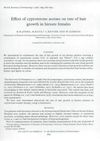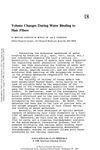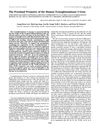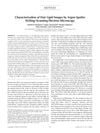 6 citations,
July 2005 in “Farmaco”
6 citations,
July 2005 in “Farmaco” A quick and simple method was created to identify minoxidil in hair-growth products using micellar electrokinetic capillary chromatography.
 October 2022 in “Endocrine journal”
October 2022 in “Endocrine journal” Testosterone and dihydrotestosterone treatments can help with penile growth in males with 5α-reductase type 2 deficiency, with dihydrotestosterone being more effective in infancy.
 28 citations,
August 2003 in “Steroids”
28 citations,
August 2003 in “Steroids” Hirsute women have lower type 2 17β-HSD enzyme levels, which improve with treatment.
 14 citations,
October 2020 in “Journal of ethnopharmacology”
14 citations,
October 2020 in “Journal of ethnopharmacology” Lepidium sativum seed extracts helped reduce inflammation and improve insulin response in obese rats on a high-fat diet.
 14 citations,
January 2016 in “Biochemical and Biophysical Research Communications”
14 citations,
January 2016 in “Biochemical and Biophysical Research Communications” Ginsenoside Re from ginseng may help hair grow by blocking a specific growth-inhibiting pathway.
 12 citations,
September 2018 in “Naturwissenschaften”
12 citations,
September 2018 in “Naturwissenschaften” Melatonin treatment increases a specific RNA in goat cells that boosts cashmere growth.
 4 citations,
March 2018 in “Daehan han'yi hag'hoeji/Journal of Korean medicine”
4 citations,
March 2018 in “Daehan han'yi hag'hoeji/Journal of Korean medicine” Astragalus membranaceus helps regrow hair and reduce hair loss symptoms.
 May 2017 in “Journal of The American Academy of Dermatology”
May 2017 in “Journal of The American Academy of Dermatology” The treatment increased hair follicle counts and is potentially effective for male hair loss without serious side effects.
 26 citations,
October 2007 in “Experimental Dermatology”
26 citations,
October 2007 in “Experimental Dermatology” L-Carnitine-L-tartrate may help hair grow and prevent hair loss.
 19 citations,
February 2018 in “Lasers in Medical Science”
19 citations,
February 2018 in “Lasers in Medical Science” Red light and LED treatments help hair grow by activating a specific cell signaling pathway.
 12 citations,
July 2021 in “Scientific Reports”
12 citations,
July 2021 in “Scientific Reports” Glutamic acid helps increase hair growth in mice.
 4 citations,
January 2015 in “Journal of drug assessment”
4 citations,
January 2015 in “Journal of drug assessment” Finasteride gel effectively and safely reduces hair thickness in women with excessive hair growth.
 June 2007 in “Advances in Dermatology and Allergology/Postępy Dermatologii i Alergologii”
June 2007 in “Advances in Dermatology and Allergology/Postępy Dermatologii i Alergologii” Finasteride is effective in stopping hair loss and promoting regrowth in most men with mild side effects.
 39 citations,
August 2008 in “Growth hormone & IGF research”
39 citations,
August 2008 in “Growth hormone & IGF research” Raspberry ketone may help grow hair and improve skin elasticity.
 26 citations,
December 1981 in “British journal of dermatology/British journal of dermatology, Supplement”
26 citations,
December 1981 in “British journal of dermatology/British journal of dermatology, Supplement” Cyproterone acetate reduced hair growth in most hirsute females and made hair softer, thinner, and lighter.
 14 citations,
April 2011 in “Journal of analytical & bioanalytical techniques”
14 citations,
April 2011 in “Journal of analytical & bioanalytical techniques” Created accurate method to measure tamsulosin hydrochloride and finasteride in tablets.
 3 citations,
August 1980 in “Acs Symposium Series”
3 citations,
August 1980 in “Acs Symposium Series” Hair increases in size when it absorbs water, and treatments like bleaching affect how much water it can take in.
 2 citations,
April 2018 in “Journal of Cosmetic Dermatology”
2 citations,
April 2018 in “Journal of Cosmetic Dermatology” Tumescent fluid increases scalp hair angles, which may improve hair transplant results and reduce surgeon fatigue.
 2 citations,
March 2013 in “Phytotherapy Research”
2 citations,
March 2013 in “Phytotherapy Research” Ascorbigen increases hair cell growth in a lab setting but does not prevent hair loss from chemotherapy in mice.
 July 2020 in “bioRxiv (Cold Spring Harbor Laboratory)”
July 2020 in “bioRxiv (Cold Spring Harbor Laboratory)” The structure of SRD5A reveals how it reduces steroids, aiding drug design for related health conditions.
 105 citations,
February 1996 in “Journal of biological chemistry/The Journal of biological chemistry”
105 citations,
February 1996 in “Journal of biological chemistry/The Journal of biological chemistry” The TGM3 gene's promoter region is key for skin and hair cell function and may aid gene therapy.
 58 citations,
February 2016 in “Scientific reports”
58 citations,
February 2016 in “Scientific reports” Blocking BACE1 and BACE2 enzymes causes hair color loss in mice.
 51 citations,
May 2011 in “Phytotherapy Research”
51 citations,
May 2011 in “Phytotherapy Research” Ginseng, especially red ginseng, may help regrow hair and block a hair loss-related enzyme.
 51 citations,
October 2002 in “British Journal of Dermatology”
51 citations,
October 2002 in “British Journal of Dermatology” Finasteride increases hair density in female androgenetic alopecia, but individual results may vary.
 23 citations,
July 1989 in “Postgraduate medical journal”
23 citations,
July 1989 in “Postgraduate medical journal” Spironolactone did not make hair thinner in women with excess hair growth.
 22 citations,
September 2019 in “ACS omega”
22 citations,
September 2019 in “ACS omega” The new nanocomposite films are stronger, protect against UV, speed up wound healing, and are antibacterial without being toxic.
 18 citations,
October 2005 in “International Journal of Pharmaceutics”
18 citations,
October 2005 in “International Journal of Pharmaceutics” Adding a small amount of TPGS to minoxidil can help hair growth, but too much TPGS reduces this effect and increases minoxidil in the blood.
 15 citations,
November 2017 in “Drug Delivery and Translational Research”
15 citations,
November 2017 in “Drug Delivery and Translational Research” Certain extracts from Curcuma aeruginosa Roxb. and germacrone can boost the skin's absorption of minoxidil, a hair growth promoter, making it more effective.
 12 citations,
February 2006 in “Lipids”
12 citations,
February 2006 in “Lipids” Hair texture changes with age due to varying levels of lipids.
 8 citations,
July 2019 in “Pure and Applied Chemistry”
8 citations,
July 2019 in “Pure and Applied Chemistry” Some natural compounds from Iris plants can block enzymes related to certain disorders, with a few affecting both targeted enzymes.





























